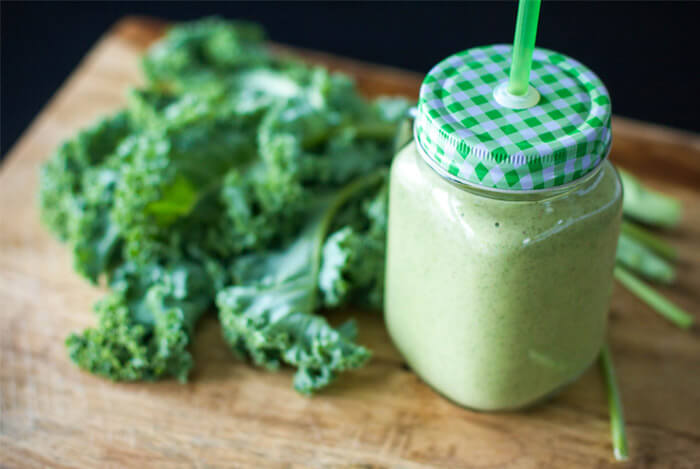Kale is having a moment right now. And while many other health food fads come and go, kale has been a steady player on the superfoods list.
Honestly, I wasn’t a big supporter of kale when all my health conscious friends were going nuts for it. From kale salads to kale chips and everything in between, I just couldn’t get excited about kale, yet it seemed to be everywhere.
But my inquisitive nature got the best of me and I had to see what all the hype was about. That’s when I discovered all the incredible health benefits associated with eating kale. It changed my mind about it and might just change yours too.
Here are my top 13 favorite benefits and reasons to eat kale.
- Kale Is High In Nutrients
- Kale is Vitamin Rich
- Vitamin A: Protect your Eyes from Degeneration
- Vitamin C: Healthy Skin and Immunity Booster
- Vitamin K for Bone Health and Cell Growth
- Helps Control Diabetes
- Kale’s Mineral Army
- High In Copper
- High In Magnesium
- Kale for Cancer Prevention
- Kale Pro Tips
Table of Contents
Kale Is High In Nutrients
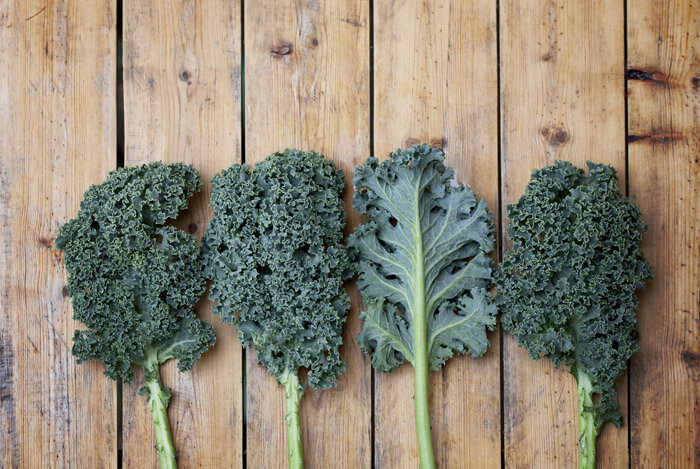
Kale is a member of the cruciferous vegetable family, which means it’s related to other dark green leafies like spinach and collards. It’s also in the same family as broccoli, arugula, and Brussels sprouts. What’s this family most famous for?
Well, cruciferous foods are some of the healthiest foods to eat on the planet, making them one of the ultimate superfoods. A quick Google search of the word superfood leads us to define them as “nutrient-rich foods considered to be especially beneficial for health and well-being”.
In just 1 cup of raw kale, you’ll find:
- 36 calories
- 2 g of protein
- Zero fat
- Zero sugars
- All nine essential amino acids (plus nine non-essential ones)
- 684% of your recommended daily intake (RDI) of vitamin K (1180% when cooked)
- 206% of your RDI of vitamin A (98% when cooked)
- 134% of your RDI of vitamin C (71% when cooked)
The USDA recommends eating 1.5 to 2 cups of dark green vegetables like this every week. Personally, I’d double that if you’re trying to eat healthier and lose weight. Kale fills you up for virtually no calories so it would really help to sneak more of it into your diet.
And if those nutrition percentages aren’t enough, kale is filled with antioxidants.


Kale is Vitamin Rich
Vitamin A: Protect your Eyes from Degeneration

Vitamin A is most praised for its ability to strengthen our eyes, especially our night vision, and kale just happens to be abundant in it.
The American Optometric Association states that “age-related macular degeneration is the leading cause of blindness in people over age 55 in the Western world and the incidence is expected to triple by 2025”.
So how can we prevent this?
Eating kale may help.
Besides a rich amount of vitamin A, kale also contains lutein and zeaxanthin. Since our body doesn’t synthesize the lutein and zeaxanthin it needs to fight off the free radicals in our retinas, we need to consume 12 mg of lutein and zeaxanthin via our diets.
Conveniently, kale contains 11 mg of lutein and zeaxanthin per serving. Cook that same serving of kale and you up your lutein and zeaxanthin to 23.8 mg.
When our bodies get enough lutein and zeaxanthin, they act like antioxidants and protect our eyes from cataract growth and reduce our risk of developing age-related macular degeneration.
Vitamin C: Healthy Skin and Immunity Booster
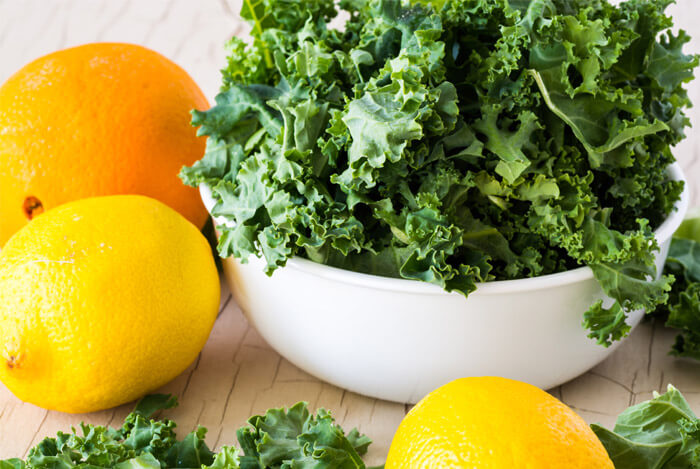
Like I mentioned before, one cup of kale has 134% of your RDI of vitamin C, which is more than what you’ll find in an orange (which has 113% of your RDI).
The benefits of vitamin C have been touted for years. It helps with cell repair and the appearance of healthy, strong skin. Vitamin C is said to boost collagen in the skin so it seems strong and supple.
Research suggests that vitamin C may also function as natural sunblock, which would prevent our skin from becoming damaged by the sun’s harmful rays.
We all know that vitamin C deficiencies include a weakened immune system, which leaves our bodies susceptible to illnesses. Since it contains zero sugar, kale may actually be more beneficial during cold season than having that glass of orange juice.
Vitamin K for Bone Health and Cell Growth
The RDI values for raw kale are higher in most categories with the exception of vitamin K. This vitamin actually improves when cooked and raises from 684% of your RDI to 1180%.
Vitamin K triggers proteins in our body to activate cell production in our bones, lungs, and heart.
Vitamin K is beneficial to our bodies because it inhibits artery hardening and can also prevent certain cancers. In a study published in the Journal of Gastroenterology and Hepatology, it was discovered that “K vitamins can inhibit the survival of some pancreatic cancer cell lines”.
There is one thing to note about vitamin K and kale: if you’ve had a stroke or are on blood thinners, speak with your doctor first before going on a kale binge. Since foods high in vitamin k, like kale, have great blood-clotting abilities, this may interfere with your prescriptions that do the opposite.
Helps Control Diabetes
Kale has 7 g of fiber per 100 calories. Fiber’s not only amazing at keeping you full and curbing your appetite, but it’s also helpful for controlling diabetes.
If you’re diabetic and your blood sugar becomes too high, the sugar “builds up in your blood and combines with your hemoglobin, becoming glycated”. The HbA1c test then measures an average of how much sugar is in your blood, giving you an average percentage from the last 3 month period.
A study in The Journal of the American Board of Family Medicine discovered that when you increase dietary fiber in patients with type 2 diabetes, fasting blood glucose and HbA1c levels both decrease.
Kale’s Mineral Army
High In Copper
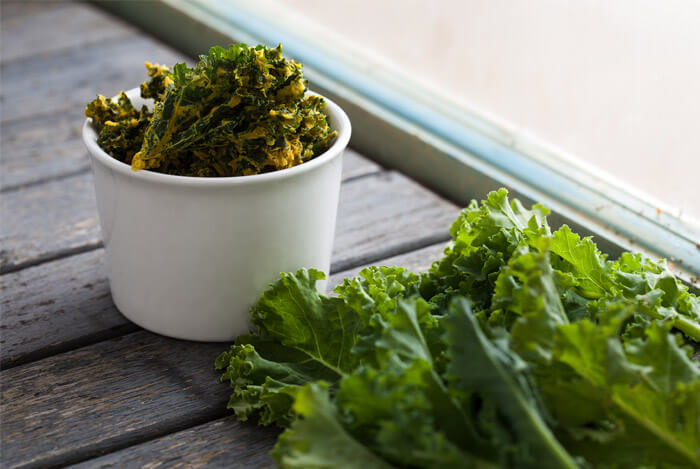
Eating a single cup of kale will provide your body’s entire copper requirement for the day.
High In Magnesium
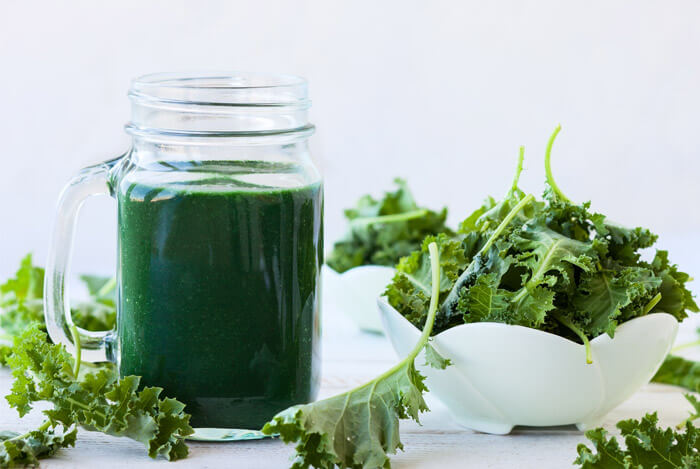
Magnesium does a lot for our bodies without getting enough credit. It’s crucial for helping us de-stress, aids in digestion, and balances our calcium levels. Magnesium helps convert vitamin D so our bodies can absorb it as calcium. And kale is full of both magnesium and calcium.
Kale for Cancer Prevention
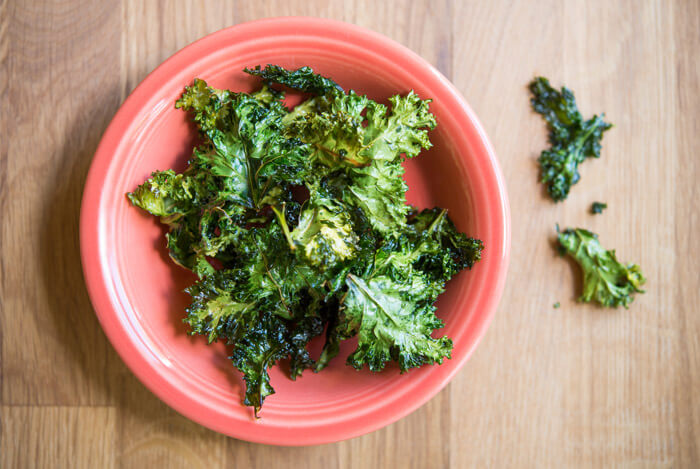
Last, but certainly not least, kale has been known to fight cancer. All cruciferous vegetables like kale contain glucosinolate phytonutrients, which are part of the isothiocyanates (ITCs) family. The two ITCs in kale most widely studied are indole-3-carbinol and sulforaphane.
According to the National Institute of Cancer (NIC), these compounds may:
- Help protect cells from DNA damage
- Inactivate carcinogens
- Have antiviral and antibacterial benefits
- Have anti-inflammatory properties
- Induce cancer cell death (apoptosis)
- Inhibit tumor blood vessel formation and tumor cell migration (needed for metastasis)
The NIC further states that, “one study found that indole-3-carbinol was more effective than placebo in reducing the growth of abnormal cells on the surface of the cervix”.
Kale Pro Tips
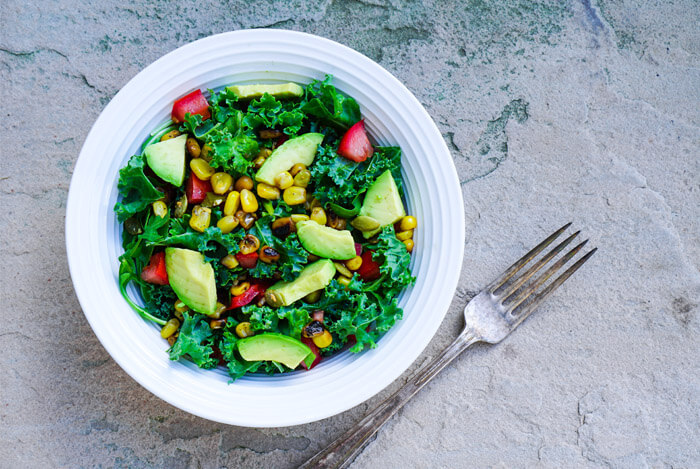
When you shop for kale, make sure to buy with your eyes. Look out for deep green leaves and sturdy stalks as these both suggest peak kale health. When you take it home, kale loves to live in the cold parts of your refrigerator bundled loosely in plastic wrap.
Kale salads are the easiest way to get your recommended daily serving. But have you ever tried replacing spinach with kale in your smoothies? Being such a great superfood, it’s perfect for this.
I also like to add kale to hearty soups. It just takes a few minutes to soften kale, but the flavor and health benefits are so worth it.
Ever try making your own kale chips? They’re pretty easy to do.
- Preheat your oven to 350 degrees, wash and dry your kale, and line a baking sheet with parchment paper.
- Cut the kale leaves into snack-sized, potato chip-like pieces. In a bowl, mix the kale, a bit of olive oil, and a pinch of salt.
- Pour the mixture on the baking sheet and spread in a single layer. Bake for about 10 or 15 minutes. Look for the edges to brown and make sure you don’t burn them. Make sure you watch these babies because it can happen quick.
Voila! Crispy, kale chips to snack on during the day instead of greasy potato chips.
